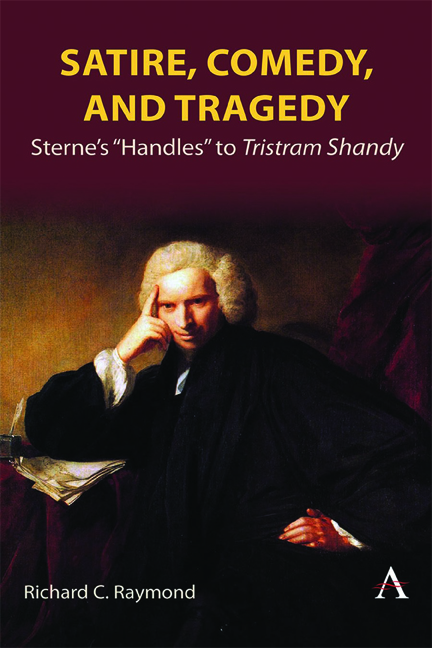Book contents
- Frontmatter
- Contents
- Preface
- 1 Walter, Toby, Tristram, and the Reader: Sterne’s Revision of “Dullness”
- 2 The Yorick Standard, Walter’s Benevolent Dullness, and Tristram’s Friends: The Plot of Satire in Tristram Shandy
- 3 “True Shandeism”: The Unhappy Comic Action in Tristram Shandy
- 4 Isolation and Death: The Tragic Undertones of Shandean Benevolent Dullness
- 5 Benevolent Dullness, Ambiguity, and the Reader: Modal Complexity and the Plots of Tristram Shandy
- 6 Laurence Sterne’s Letters
- 7 The Shandean Sermons of Parson Sterne
- 8 Parson Yorick in A Sentimental Journey and in A Continuation of Bramine’s Journal
- 9 The International Perspective on Tristram Shandy and the Argument
- References
- Index
4 - Isolation and Death: The Tragic Undertones of Shandean Benevolent Dullness
Published online by Cambridge University Press: 01 March 2024
- Frontmatter
- Contents
- Preface
- 1 Walter, Toby, Tristram, and the Reader: Sterne’s Revision of “Dullness”
- 2 The Yorick Standard, Walter’s Benevolent Dullness, and Tristram’s Friends: The Plot of Satire in Tristram Shandy
- 3 “True Shandeism”: The Unhappy Comic Action in Tristram Shandy
- 4 Isolation and Death: The Tragic Undertones of Shandean Benevolent Dullness
- 5 Benevolent Dullness, Ambiguity, and the Reader: Modal Complexity and the Plots of Tristram Shandy
- 6 Laurence Sterne’s Letters
- 7 The Shandean Sermons of Parson Sterne
- 8 Parson Yorick in A Sentimental Journey and in A Continuation of Bramine’s Journal
- 9 The International Perspective on Tristram Shandy and the Argument
- References
- Index
Summary
Death, says Alvin Kernan, always emerges as the great symbol of tragedy. Isolation, therefore, as Northrop Frye explains, becomes the primary theme of the “tragic mode” in which the hero's exclusion from humanity often ends in exclusion from life. Though it seems at first strange to speak of tragedy in a satiric work devoted to laughter, the “underlying tonality” of Tristram Shandy modulates with tragic action, for the benevolent dullness of Sterne's comic heroes ends in either isolation or death.
Before progressing with his own life and opinions, Tristram relates the story of Yorick's death, which ends with the symbolic black page. I will therefore begin this chapter with a brief return to the tragic “fatality” that “attends the actions” of Yorick in his campaign against grave dullness (1: 24), focusing this time on Eugenius, who functions, to use Frye's terminology, as the “outspoken critic of the tragic action” and the witness of Yorick's cathartic death (Frye 1957, 218). Agreeing with Eugenius rather than with Helene Moglen, who finds Yorick an innocent victim of a dull community, I will show that Yorick, like most tragic protagonists in Frye's “high mimetic” mode, makes choices that cause his fate.
Eugenius’ Tragic Friend
We have already seen the type of Tristram's isolation in the penalty Yorick pays for his jesting campaign against dullness. We have also heard the warning of Yorick's friend Eugenius that the “fools” and “knaves” rebuked by Yorick's “sport” will challenge the parson with “war” (1: 32). As the “faithful friend,” whom Frye describes as “refusing, or at any rate resisting” that tragic hero's “movement toward catastrophe” (Frye 1957, 218), generous Eugenius spells out for the incorrigible parson-jester the “consequences” of such warfare with worldly dullness (1: 29). First, Yorick will suffer his “faith questioned,” his “works belied,” his “wit forgotten,” and his “learning trampled on” by the “malice” of “hired ruffians” (1: 32). Finally, in the “last scene” of his “tragedy,” the “helpless” parson will be “sacrificed” on the “fire” fueled by his jests in order to appease those who have felt the sting of his corrective wit (1:32).
- Type
- Chapter
- Information
- Satire, Comedy and TragedySterne's 'Handles' to <i>Tristram Shandy</i>, pp. 83 - 102Publisher: Anthem PressPrint publication year: 2023



